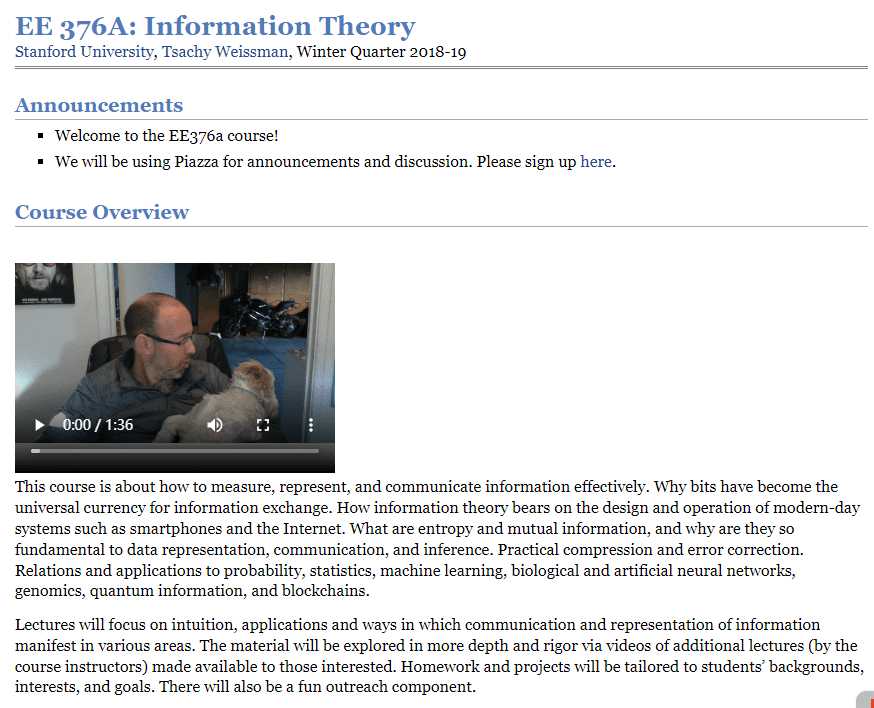Statistics-lab™可以为您提供stanford.edu EE376A information theory信息论的代写代考和辅导服务!

EE376A information theory课程简介
Information theory is the branch of mathematics that deals with the quantification, storage, and communication of information. It was developed by Claude Shannon in the 1940s, and has applications in a wide range of fields, including communications, computer science, physics, and biology.
The basic idea in information theory is that information can be thought of as a reduction in uncertainty. The more uncertain we are about something, the more information we gain when we learn about it. For example, if I tell you that the weather tomorrow will be either sunny or rainy, and you don’t know which one, then your uncertainty about the weather is high. If I then tell you that the weather will be sunny, then your uncertainty is reduced, and you gain some information.
PREREQUISITES
Information theory is the branch of mathematics that deals with the quantification, storage, and communication of information. It was developed by Claude Shannon in the 1940s, and has applications in a wide range of fields, including communications, computer science, physics, and biology.
The basic idea in information theory is that information can be thought of as a reduction in uncertainty. The more uncertain we are about something, the more information we gain when we learn about it. For example, if I tell you that the weather tomorrow will be either sunny or rainy, and you don’t know which one, then your uncertainty about the weather is high. If I then tell you that the weather will be sunny, then your uncertainty is reduced, and you gain some information.
EE376A information theory HELP(EXAM HELP, ONLINE TUTOR)
Proposition 2.5.2. Let $(\pi, \mathbb{H})$ be a representation of the $C^*$-algebra $\mathcal{A}$. Then the following statements are equivalent:
- The closed subspace $[\pi(\mathcal{A}) \mathbb{H}]$ spanned by the set ${\pi(\mathbf{a}) \zeta \mid \mathbf{a} \in \mathcal{A}, \zeta \in \mathbb{H}}$, coincides with the whole space $\mathrm{H}$.
- For any nonzero $\zeta \in \mathbb{H}$, there exists an element $\mathbf{a} \in \mathcal{A}$ with $\pi(\mathbf{a}) \zeta \neq 0$.
Proof. (1) $\Rightarrow$ (2). Suppose that (1) holds. Assume that there exists a nonzero $\zeta \in \mathbb{H}$ such that $\pi(\mathbf{a}) \zeta=0$ for all $\mathbf{a} \in \mathcal{A}$ for contradiction purpose. For any $\eta \in \mathbb{H}$, we have
$$
\langle\pi(\mathbf{a}) \eta, \zeta\rangle_{\mathrm{H}}=\left\langle\eta, \pi(\mathbf{a})^* \zeta\right\rangle_{\mathrm{H}}=\left\langle\eta, \pi\left(\mathbf{a}^\right) \zeta\right\rangle_{\mathrm{H}}=0, \text { since } \mathbf{a} \in \mathcal{A} \text { implies } \mathbf{a}^ \in \mathcal{A} \text {. }
$$
Hence, $\zeta$ is orthogonal to $[\pi(\mathcal{A}) \mathbb{H}]$. By the assumption that $[\pi(\mathcal{A}) \mathbb{H}]=\mathbb{H}$, this means that $\zeta=0$. This is a contradiction. Hence, (2) follows.
(2) $\Rightarrow$ (1). Conversely, suppose that (2) holds. Let $\zeta$ be a vector of $\mathbb{H}$ orthogonal to $[\pi(\mathcal{A}) \mathbb{H}]$. We then have
$$
\begin{aligned}
0 & =\left\langle\zeta, \pi\left(\mathbf{a}^{\mathbf{a}} \mathbf{a}\right) \zeta\right\rangle_{\mathbb{H}}=\left\langle\zeta, \pi\left(\mathbf{a}^\right) \pi(\mathbf{a}) \zeta\right\rangle_{\mathbf{H}} \ & =\left\langle\zeta, \pi^(\mathbf{a}) \pi(\mathbf{a}) \zeta\right\rangle_{\mathbf{H}}=\langle\pi(\mathbf{a}) \zeta, \pi(\mathbf{a}) \zeta\rangle_{\mathrm{H}}, \quad \mathbf{a} \in \mathcal{A},
\end{aligned}
$$
so that $|\pi(\mathbf{a}) \zeta|_{\mathrm{H}}^2=0$ for every $\mathbf{a} \in \mathcal{A}$. By assumption, $\zeta=0$. Therefore, $([\pi(\mathcal{A}) \mathrm{H}])^{\perp}=$ ${\mathbf{0}}$. This implies that $[\pi(\mathcal{A}) \mathbb{H}]=\mathbb{H}$. Thus, (1) follows. This proves the proposition.
Theorem 3.2.1 (Prohorov’s compactness criterion). A closed subset $\mathcal{K} \subset \mathcal{S}(\mathbb{H})$ is compact (in the trace-class norm) if and only if for every $\epsilon>0$ there is a finite-dimensional projection $\mathbf{P}\epsilon$ on $\mathbb{H}$ such that $\operatorname{tr}\left[\rho \mathbf{P}\epsilon\right] \geq 1-\epsilon$ for all $\rho \in \mathcal{K}$.
Proof. $(\Rightarrow)$. We follow the proof provided in Chang [22] for necessity condition as follows. Let $\mathcal{K}$ be a compact subset of $\mathcal{S}(\mathbb{H})$. We want to show that for every $\epsilon>0$ there is a finite-dimensional projection $\mathbf{P}\epsilon$ on $\mathrm{H}{\text {such that } \operatorname{tr}}\left[\rho \mathbf{P}_\epsilon\right] \geq 1-\epsilon$ for all $\rho \in \mathcal{K}$. Suppose this were not true for contradiction purpose. Then there is an $\epsilon>0$ such that for any arbitrary finite rank projection operator $\mathbf{P}$ there exists a state $\rho \in \mathcal{K}$ such that $\operatorname{tr}[\rho \mathbf{P}]<1-\epsilon$. Let $\left(\mathbf{P}n\right){n=1}^{+\infty}$ be a sequence of finite rank projections on $\mathrm{H}$ monotonically converging to the identity operator $\mathbf{I}{\mathrm{H}}$ on $\mathrm{H}{\text {in }}$ the weak operator topology. That is,
$$
\lim {n \rightarrow+\infty}\left\langle\phi, \mathbf{P}_n \psi\right\rangle{\mathbf{H}}=\left\langle\phi, \mathbf{I}{\mathbb{H}} \psi\right\rangle{\mathbb{H}}=\langle\phi, \psi\rangle_{\mathbb{H}}, \quad \forall \phi, \psi \in \mathbb{H}
$$
Textbooks
• An Introduction to Stochastic Modeling, Fourth Edition by Pinsky and Karlin (freely
available through the university library here)
• Essentials of Stochastic Processes, Third Edition by Durrett (freely available through
the university library here)
To reiterate, the textbooks are freely available through the university library. Note that
you must be connected to the university Wi-Fi or VPN to access the ebooks from the library
links. Furthermore, the library links take some time to populate, so do not be alarmed if
the webpage looks bare for a few seconds.

Statistics-lab™可以为您提供stanford.edu EE376A information theory信息论的代写代考和辅导服务! 请认准Statistics-lab™. Statistics-lab™为您的留学生涯保驾护航。